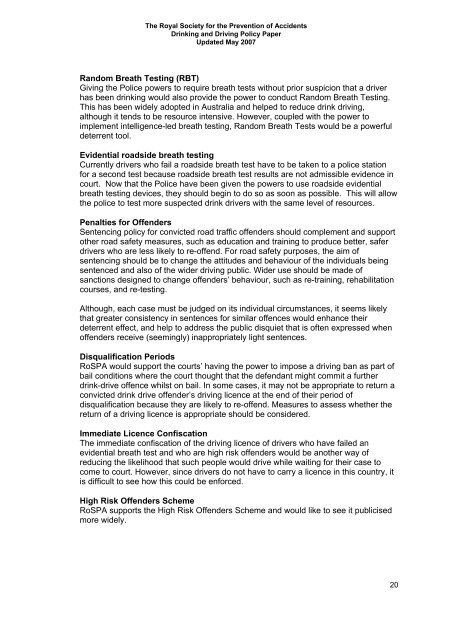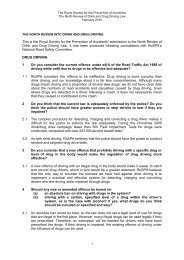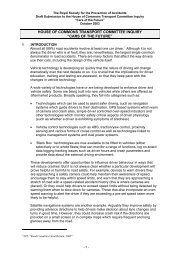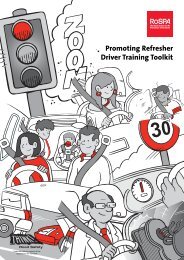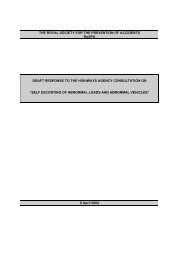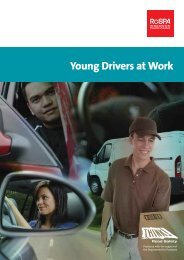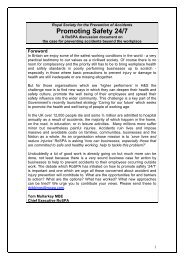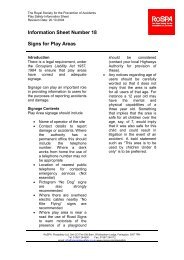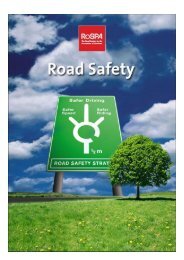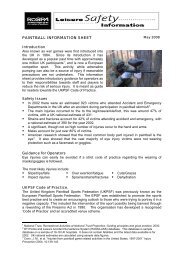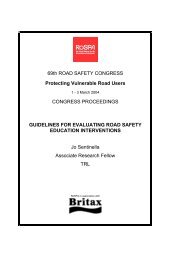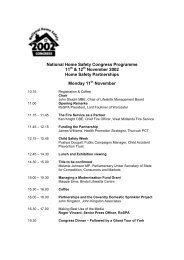RoSPA Drinking and Driving Policy Paper 2007
RoSPA Drinking and Driving Policy Paper 2007
RoSPA Drinking and Driving Policy Paper 2007
You also want an ePaper? Increase the reach of your titles
YUMPU automatically turns print PDFs into web optimized ePapers that Google loves.
The Royal Society for the Prevention of Accidents<br />
<strong>Drinking</strong> <strong>and</strong> <strong>Driving</strong> <strong>Policy</strong> <strong>Paper</strong><br />
Updated May <strong>2007</strong><br />
R<strong>and</strong>om Breath Testing (RBT)<br />
Giving the Police powers to require breath tests without prior suspicion that a driver<br />
has been drinking would also provide the power to conduct R<strong>and</strong>om Breath Testing.<br />
This has been widely adopted in Australia <strong>and</strong> helped to reduce drink driving,<br />
although it tends to be resource intensive. However, coupled with the power to<br />
implement intelligence-led breath testing, R<strong>and</strong>om Breath Tests would be a powerful<br />
deterrent tool.<br />
Evidential roadside breath testing<br />
Currently drivers who fail a roadside breath test have to be taken to a police station<br />
for a second test because roadside breath test results are not admissible evidence in<br />
court. Now that the Police have been given the powers to use roadside evidential<br />
breath testing devices, they should begin to do so as soon as possible. This will allow<br />
the police to test more suspected drink drivers with the same level of resources.<br />
Penalties for Offenders<br />
Sentencing policy for convicted road traffic offenders should complement <strong>and</strong> support<br />
other road safety measures, such as education <strong>and</strong> training to produce better, safer<br />
drivers who are less likely to re-offend. For road safety purposes, the aim of<br />
sentencing should be to change the attitudes <strong>and</strong> behaviour of the individuals being<br />
sentenced <strong>and</strong> also of the wider driving public. Wider use should be made of<br />
sanctions designed to change offenders’ behaviour, such as re-training, rehabilitation<br />
courses, <strong>and</strong> re-testing.<br />
Although, each case must be judged on its individual circumstances, it seems likely<br />
that greater consistency in sentences for similar offences would enhance their<br />
deterrent effect, <strong>and</strong> help to address the public disquiet that is often expressed when<br />
offenders receive (seemingly) inappropriately light sentences.<br />
Disqualification Periods<br />
<strong>RoSPA</strong> would support the courts’ having the power to impose a driving ban as part of<br />
bail conditions where the court thought that the defendant might commit a further<br />
drink-drive offence whilst on bail. In some cases, it may not be appropriate to return a<br />
convicted drink drive offender’s driving licence at the end of their period of<br />
disqualification because they are likely to re-offend. Measures to assess whether the<br />
return of a driving licence is appropriate should be considered.<br />
Immediate Licence Confiscation<br />
The immediate confiscation of the driving licence of drivers who have failed an<br />
evidential breath test <strong>and</strong> who are high risk offenders would be another way of<br />
reducing the likelihood that such people would drive while waiting for their case to<br />
come to court. However, since drivers do not have to carry a licence in this country, it<br />
is difficult to see how this could be enforced.<br />
High Risk Offenders Scheme<br />
<strong>RoSPA</strong> supports the High Risk Offenders Scheme <strong>and</strong> would like to see it publicised<br />
more widely.<br />
20


